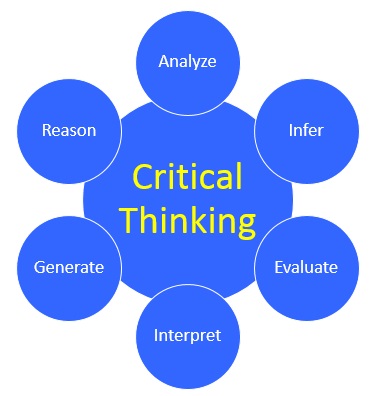According to Philosophy.hku.hk, ‘Critical thinking is the ability to think clearly and rationally about what to do or what to believe. It includes the ability to engage in reflective and independent thinking.
Critical thinking is not a matter of accumulating information. A person with a good memory and who knows a lot of facts is not necessarily good at critical thinking. A critical thinker is able to deduce consequences from what he knows, and he knows how to make use of information to solve problems, and to seek relevant sources of information to inform himself. Source: http://philosophy.hku.hk/think/critical/ct.php
************************************************
As a child, I was often encouraged to ask the question ‘Why?’. This has stayed with me throughout my life. I have always had a curiosity about new things, old things, why things are done one way over another, why an engine is built in a particular way, why a baking recipe requires me to use the ingredients in a certain order, why a mattress is shaped this way, why a dish is served this instead of that, and so this list goes on.
I have never felt embarrassed to ask Why? Indeed, it was the response from one of my first bosses (a super clever PhD from the world prestigious MIT, USA), who encouraged me to keep asking questions, even admitting that most of his own colleagues often pretended to know more than they actually did, simply because they were too proud or embarrassed to ask Why?, only to be humiliated by a client. Why put yourself in this position?
As a young child, I don’t remember watching too much TV or being addicted to my phone (thank goodness the internet was not used by the mass market back then). All the games we played were outdoors and we had to use our imagination to build houses, roads, charcoal ovens, cars and more. Reading was a favourite pastime and this fed my enquiring mind. When bored, the old Encyclopaedia Britannica was always a good source to help pass time.
Fast forward the 21st century and our youth are healthier than before, more educated than past generations and have access to incredible online educational platforms and yet, many of our youth are not curious about the big, intertwined global world that we all live in. Many are often not curious about subjects outside their domain, often displaying an attitude of: “If I am not going to be tested on it, why do I need to learn it?”
Our youth need to take responsibility for what they feed their minds. After all, who is responsible for this, if not you? If you keep pouring vinegar instead of water on to a garden, do you really expect to see flowers blossom in this same garden? No. And yet you keep reading, sharing, and participating in nonsense conversations online and then wonder why you cannot answer basic interview questions or why you cannot defend your salary request to a prospective employer? Or why you struggle to defend your prices to a client? This is why many of our youth cannot defend themselves in an articulate manner and so instead, differences are won or lost on the grounds of personal insults, tribe or gender.
Critical thinking empowers you, my friend. If you rely on Twitter for your news and views then don’t be surprised to become media illiterate. It is important to listen to news but often this 24 hour rolling news cycle is geared to keep you switched on. Don’t rely on only one media source for your news; read multiple sources.
Most media companies in the world, only represent the views of their rich owners or political leanings of the blogger. Ask yourself this: How can tax breaks for the rich, help you, a struggling student? Or, how does taxing the rich at 70% help the economy when all such rich people will simply hire top lawyers and accountants to try and find legal loopholes to get out of paying such tax. Unfortunately for you, because you have not developed your critical thinking skills, you read and agree with issues even without asking how this or that policy will benefit you, Jonathan or Stella? You are being duped my friend and you have only yourself to blame. The fact that you can read this means: You can read, You Can write and You have access to the internet. So, in a world where Google is free, ignorance is a choice.
Our youth have to build the confidence to challenge adults and to ask why. No one can do this for you. Critical thinking is important in this day and age. Many companies now run tests (psychometric or other), specifically to test new candidates’ abilities to not only think logically but to defend themselves in this manner too. No one wins arguments through whining or claiming the questions were too tough. Stop whining about how unfair the world is; focus instead on what you can change or influence such as your disposition to be critical and to ask questions.
Critical thinking is important. Critical thinking is not about being a critic but is about seeing things from all or many perspectives. It is the ability to ask Why which in turn, builds your confidence and builds you up in to an adult who can persuade opponents why s/he is right.
For example, only having friends who think like you or reading media which only highlights your points of views, does not build critical thinking instead, this is what they call ‘Confirmation Bias and I will write about this one of these days.
Building your critical thinking skills requires you to step outside your box and meet and speak with people who do not always think like you. This is why diversity is so important; people from different backgrounds, races, religions, gender & tribes, force us to build our critical thinking skills. We start to see things from different perspectives, we are able to see and appreciate different opinions. We are able to learn. We are, in effect, getting out of our comfort zone.
Critical thinking can benefit your social communication skills, team work and empathy, as well as your ability to judge appropriately. Critical thinking enables you to ask: is this plausible, how reliable is this, what evidence is there to support this viewpoint? Critical Thinking gives you confidence to take appropriate actions which may not always be to your own benefit but rather, to the benefit of your community at large.
Critical thinking enables you to analyse everything both good and bad and enables you to participate in the wider world! So, always ask Why? Embrace diversity, and build skills that will enable you to put things in to perspective instead of believing every rumour or “fake news” you read on your newsfeed! To read more posts by Miriam, click HERE
Sources: Miriam Mukasa, BBC (Critical Thinking, Series 10), Philosophy.hku.hk


